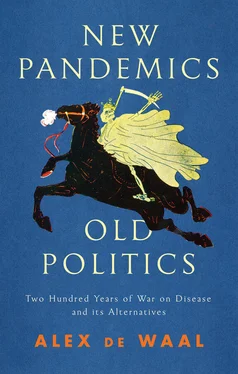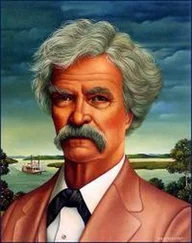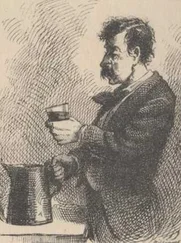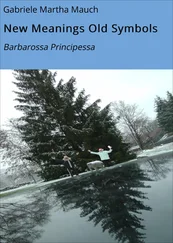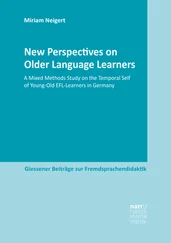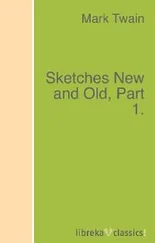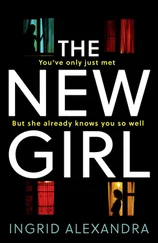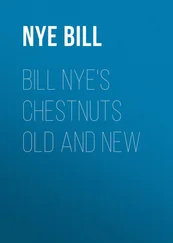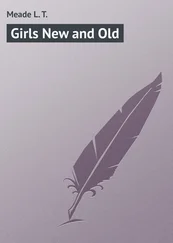235 250
236 251
237 252
238 253
239 254
240 255
241 256
242 257
243 258
244 259
245 260
246 261
247 262
248 263
249 264
250 265
251 266
252 267
253 268
254 269
255 270
256 271
257 272
258 273
259 274
260 275
261 276
262 277
263 278
264 279
265 280
266 281
267 282
268 283
269 284
270 285
271 286
272 287
273 288
274 289
275 290
276 291
277 292
278 293
279 294
280 295
281 296
282 297
To my mother, Esther de Waal, who taught me how to think
NEW PANDEMICS, OLD POLITICS
Two Hundred Years of War on Disease and its Alternatives
Alex de Waal
polity
Copyright © Alex de Waal 2021
The right of Alex de Waal to be identified as Author of this Work has been asserted in accordance with the UK Copyright, Designs and Patents Act 1988.
First published in 2021 by Polity Press
Polity Press
65 Bridge Street
Cambridge CB2 1UR, UK
Polity Press
101 Station Landing
Suite 300
Medford, MA 02155, USA
All rights reserved. Except for the quotation of short passages for the purpose of criticism and review, no part of this publication may be reproduced, stored in a retrieval system or transmitted, in any form or by any means, electronic, mechanical, photocopying, recording or otherwise, without the prior permission of the publisher.
ISBN-13: 978-1-5095-4781-4
A catalogue record for this book is available from the British Library.
Library of Congress Cataloging-in-Publication Data
Names: De Waal, Alex, author.
Title: New pandemics, old politics : two hundred years of war on disease and its alternatives / Alex de Waal.
Description: Medford : Polity Press, 2021. | Includes bibliographical references and index. | Summary: “A brilliant account of the politics behind modern pandemics by a leading expert on humanitarian crisis and infectious disease”-- Provided by publisher.
Identifiers: LCCN 2020052814 (print) | LCCN 2020052815 (ebook) | ISBN 9781509547791 (hardback) | ISBN 9781509547807 (paperback) | ISBN 9781509547814 (epub)
Subjects: LCSH: Epidemics--Political aspects. | Epidemiology--Political aspects.
Classification: LCC RA649 .D49 2021 (print) | LCC RA649 (ebook) | DDC 614.4--dc23
LC record available at https://lccn.loc.gov/2020052814LC ebook record available at https://lccn.loc.gov/2020052815
The publisher has used its best endeavours to ensure that the URLs for external websites referred to in this book are correct and active at the time of going to press. However, the publisher has no responsibility for the websites and can make no guarantee that a site will remain live or that the content is or will remain appropriate.
Every effort has been made to trace all copyright holders, but if any have been overlooked the publisher will be pleased to include any necessary credits in any subsequent reprint or edition.
For further information on Polity, visit our website:
politybooks.com
This book began life as a compilation of reflections provisionally entitled ‘Critical Thinking in a Pandemic’, which became an essay in the 3 April 2020 online issue of Boston Review , entitled ‘New Pathogen, Old Politics’ ( http://bostonreview.net/science-nature/alex-de-waal-new-patho-gen-old-politics). The Boston Review editors, Deb Chasman and Matt Lord, were indulgent, encouraging, and usefully critical. I have drawn on comments and critique from colleagues, students, and former students, including Lisa Avery, Bridget Conley, Sarah Detzner, Ella Duncan, Sulmaan Khan, Jared Miller, Aditya Sarkar, and Ben Spatz, as well as Louise Knight and Inès Boxman at Polity Press and anonymous reviewers.
1Following the Science, Following the Script
A pandemic pathogen is scary and strange. It is new to medical science and society and it is everywhere. At the critical early moment of a pandemic, much of the advice of doctors and epidemiologists will be vague and some will be wrong. Those who know their subject best will have the deepest uncertainties. No expert can say when and how the pandemic will end. There isn’t even an agreed definition of ‘pandemic’ – an arcane but revealing absence.
Public leaders pay homage to ‘following the science’ but they actually follow a script. It’s a storyline with a reassuring ending. It goes something like this:
We are at war against an invisible enemy. While our doctors and nurses combat the disease at the frontline in hospitals, while our scientists seek the cures and vaccines in their laboratories, the population must make sacrifices on the home front. We should trust our government while we forgo liberties and livelihoods. The pandemic will end with a medical magic bullet that vanquishes the pathogen. Then we will return to our way of life and be safe.
This is the basic outline of a war story. It’s also a tale of conquest of the microbial world and a charter for emergency rule that sets aside human rights and civil liberties. ‘War on disease’ is not a harmless metaphor. It suppresses critical thinking. It focuses our worries on a singular germ as our enemy, forgetting about other things – such as devastated ecologies and an inequitable society – that are no less pathogenic. And its comforting ending is false – even if the discovery of a vaccine or therapy means that leaders feel entitled to declare ‘victory’.
This book is about this gargantuan and harmful error. It is about how and why the ‘war on disease’ script was written and how it guides our thinking and shapes our institutions in ways that we may not realize. When we most need a narrative to make sense of a devastating pandemic, the ‘war on disease’ not only fails, but also stops us recognizing our failures. This book is also about some very different visions. Scientists, social activists, and public health experts have other analyses and narratives – rigorous, practical, democratic, holistic – that we should pursue. The Covid-19 pandemic and crisis is showing us that the ‘war on disease’ is at best humdrum and at worst dangerous, and that these alternatives are urgent.
The ‘war on disease’ script is like the sheaf of documents in a desk drawer seldom opened. It consists of a handful of different scripts, pictures, and reminders. Some are Chinese, most are European or American. Also in the drawer are other images for disease outbreaks: a journey, an imbalance in the cosmos, a crime investigation, a storm, and a forest fire. 1
In an emergency, we think fast and intuitively. To change the metaphor, being caught by a pandemic is like being caught in a storm when hiking in the mountains: suddenly the clouds roll in, darkness descends, rain lashes down, and the stones become slippery. We can’t stay where we are, and we can’t wait for the storm to clear to look around and find the best way down – we want to find a way to safety right away. There’s a handrail: we grasp onto it because it keeps us steady. This handrail is our intuition, built from metaphors, storylines, images, and memories of what worked in the past. It’s more than just a thesaurus, it’s actually how we think – and so it usually goes unexamined. In the moment of greatest turmoil, fear, and uncertainty, it’s reassuring. The handrail makes each step feel safe, and we assure ourselves that we can look at the map later on. That map will show us some other directions we might have taken, had we stopped to orient ourselves more carefully. We may regret that we didn’t pause for a few moments to consider those other paths.
Читать дальше
